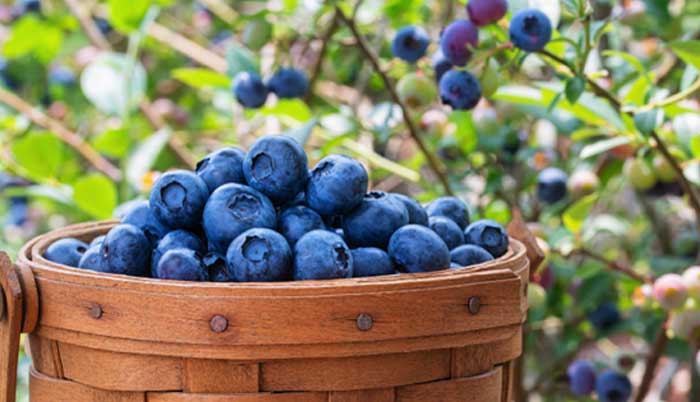![]() Home > Health
Home > Health
Blueberries: A Nutrient-Packed Superfood For Holistic Wellness

NEWS TARGET | NATURAL NEWS
![]() May 7th, 2025 | 01:46 AM |
May 7th, 2025 | 01:46 AM | ![]() 460 views
460 views
NATURAL NEWS
Blueberries are rich in antioxidants (especially anthocyanins), fiber, vitamins (C, K) and manganese, supporting heart health, brain function, digestion and disease prevention.
Native to North America, blueberries were used by Indigenous peoples for food and medicine. Modern cultivation began in the 20th century, making them a globally popular superfood.
Blueberries may improve cognitive function, lower blood pressure, reduce cancer risk and combat oxidative stress. Excessive consumption may cause mild digestive issues due to their high fiber content.
Conventionally grown blueberries often contain harmful pesticides (e.g., phosmet, carbaryl). Opt for organic or wild (frozen) varieties to minimize chemical exposure.
Enjoy blueberries in smoothies, baked goods, salads, savory dishes (like glazes) and beverages. Their adaptability makes them an easy addition to a health-focused diet.
Blueberries are more than just a delicious, tart-sweet fruit – they are a powerhouse of nutrition, celebrated for their health benefits and versatility in culinary applications. As one of nature's most potent superfoods, blueberries have been revered for centuries both for their flavor and their medicinal properties.
Brief history of blueberries
Blueberries belong to the Vaccinium genus, which also includes cranberries and bilberries. Native to North America, wild blueberries have been used by Indigenous peoples for thousands of years, both as food and natural medicine. Native American tribes used blueberries in teas, dried them for winter storage and even used them as a natural dye.
Modern cultivation of blueberries began in the early 20th century when botanist Elizabeth White and U.S. Department of Agriculture Chief Botanist Frederick Coville successfully domesticated wild blueberries. Since then, blueberries have become a global superfood, with the United States, Canada and Chile as some of the largest producers today.
Nutritional profile and health benefits
Blueberries are packed with essential nutrients, making them a staple in any health-conscious diet. Here's a breakdown of their key nutritional components:
Antioxidants (especially anthocyanins)
Blueberries are one of the richest sources of antioxidants, particularly anthocyanins, which give them their deep blue color. These compounds combat oxidative stress, reduce inflammation and may lower the risk of chronic diseases like heart disease and cancer.
Fiber
A single cup of blueberries provides about four grams (g) of dietary fiber, which aids digestion, promotes gut health and helps regulate blood sugar levels.
Vitamins and minerals
Blueberries provide essential vitamins and minerals such as:
Vitamin C to support immune function and skin health
Vitamin K, which is essential for blood clotting and bone health
Manganese for metabolism and antioxidant defense
Blueberries also have a low glycemic index, which means they can support healthy blood sugar management.
Blueberries are overwhelmingly considered a positive addition to a healthy diet. Their high antioxidant, fiber and essential nutrient content makes them beneficial for:
Brain health (may improve memory and cognitive function)
Heart health (lowers blood pressure and cholesterol)
Anti-aging (protects cells from oxidative damage)
Cancer prevention (due to their high polyphenol content)
There are no significant negative effects of blueberries unless consumed in excessive amounts, which could lead to digestive discomfort due to their high fiber content. (Related: Blueberries: superfood for the heart.)
While blueberries are nutritious, conventionally grown blueberries can contain pesticide residues. The Environmental Working Group (EWG) has listed blueberries on its "Dirty Dozen" list, meaning they are among the most pesticide-contaminated produce in the United States. Common pesticides found on blueberries include phosmet (an insecticide), carbaryl (a neurotoxin) and captan (a fungicide).
Heavy metals like cadmium and lead can also be absorbed by blueberries from the soil, though levels are generally low.
To avoid these harmful contaminants, opt for organic blueberries. Wild blueberries (often sold frozen) are another excellent choice, as they tend to have fewer pesticides than conventional blueberries.
Culinary uses
Blueberries are incredibly versatile and can be used in both sweet and savory dishes. Here are some popular ways to incorporate them into your diet:
Breakfast and smoothies
Blueberry oatmeal or chia pudding
Smoothie bowls (blended with bananas, spinach and almond milk)
Pancakes or waffles (fresh or as a compote)
Baked goods and desserts
Blueberry muffins or scones
Pies and tarts
Homemade blueberry jam (without refined sugar)
Savory dishes
Salads (paired with spinach, goat cheese and walnuts)
Glazes for meats (blueberry balsamic reduction for chicken or pork)
Beverages
Blueberry-infused water or herbal tea
Fermented blueberry kombucha
Smoothies with almond milk and protein powder
Blueberries are a true superfood, offering a wealth of health benefits while being delicious and easy to incorporate into daily meals. Whether you enjoy them fresh, frozen or in recipes, their antioxidant power supports holistic wellness beyond conventional medicine's capabilities.
For those seeking natural healing and toxin-free nutrition, organic blueberries are the best choice. By making them a regular part of your diet, you can harness their full potential for supporting longevity, vitality and disease prevention.
This story is not medical advice and is not intended to treat or cure any disease. Always consult with a qualified naturopathic physician for personalized advice about your specific health situation or concern.
Source:
courtesy of NATURALNEWS
by Laura Harris
If you have any stories or news that you would like to share with the global online community, please feel free to share it with us by contacting us directly at [email protected]